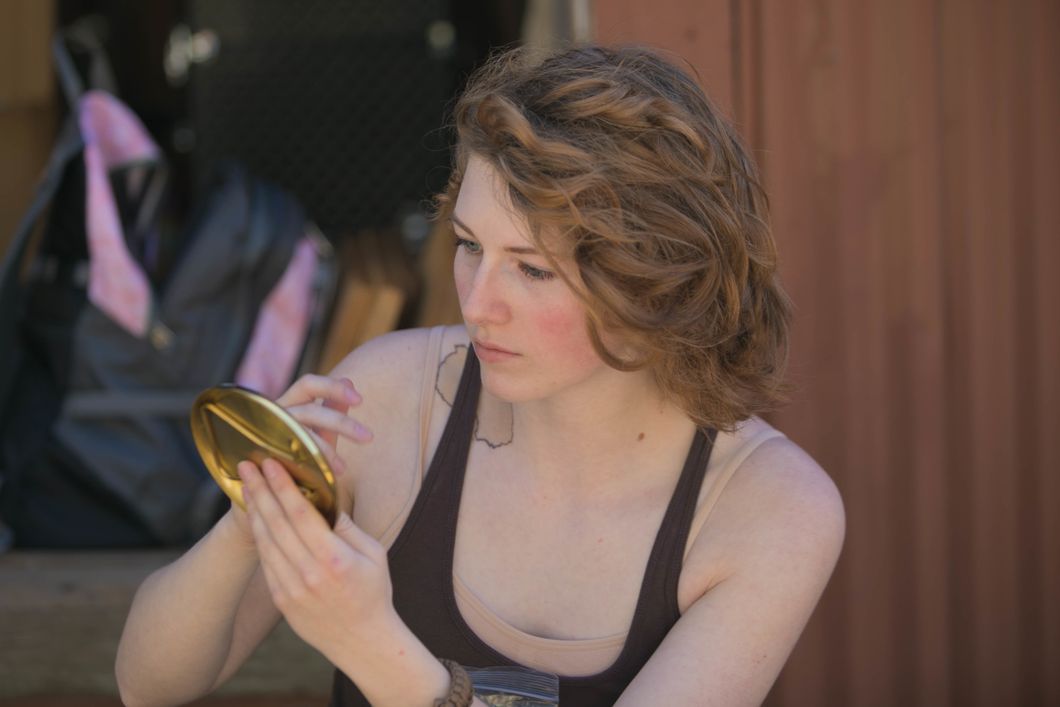Before I say anything, let's get one thing straight. I am just as sick of men saying that we wear makeup to "trick them" as the next woman. We've all seen tweets highlighting how laughable it is that men would believe our eyelids are naturally gold or that our lips are actually ruby red, and I agree, it's laughable.
I don't know about you, but the most common justification for wearing makeup that I hear is that we wear it for ourselves. It's been proven that women who don't wear makeup are punished socially and financially, and it's also clear that since the dawn of modern marketing, women have been convinced that our only purpose is to please men. While these are just two little factors, they both contribute to the conclusion that we don't simply wear makeup for ourselves.
From one perspective, women should be free to wear as much or as little of it as they'd like. But when half of the women in the United States feel so insecure about leaving the house or going to work bare-faced that they feel like they don't have a choice, the conclusion that it's more than just "for fun" becomes clearer.
The argument that we wear makeup for ourselves is inherently flawed: if we truly wore makeup for ourselves in a literal sense, we would apply it at the beginning of the day so we could stare at our reflection at home, not before work or before we leave the house.
In a sense, we wear makeup for those around us. We wear makeup to create the image of ourselves that we want those around us to perceive. We cover up our physical flaws with concealer and accentuate the features we want attention drawn to in order to create the face we wish we had.
We do this because it allows us to feel in control, to literally influence how people view us. It gives us confidence because we can erase all the features we dislike and enhance the ones we do like. And what's wrong with being confident?
The argument that we wear makeup for our own confidence is true. But the argument that we wear it for others is hidden in the insecurities we had to begin with.
In the past, when I've mentioned wearing makeup to quell insecurities, family and friends have said that they're already confident and simply wanted to enhance some of their features.
But if you were truly confident in your looks, you wouldn't feel the desire to change anything. If you were comfortable with the size and color of your lips you wouldn't want to enhance them with lipstick or fillers, if you were comfortable with the length and color of your eyelashes you wouldn't feel the desire to enhance them with mascara, and if you were truly comfortable with your eyes, you wouldn't consider altering them with eyeliner or eyeshadow.
To those who believe you choose to wear makeup despite being confident, the cosmetic industry not only preys on your insecurities, it creates new ones so it can sell you innovative products. The female cosmetic industry was born out of insecurities and continues to run on them today. The truth is, if we didn't have insecurities about our faces, bodies, and hair, the cosmetic industry wouldn't exist.
Based on this reasoning, we don't wear makeup for personal enjoyment. We wear it as a necessity.
On a less sinister note, I believe that the other groups we make ourselves up for are potential friends and partners. Yes, this does encompass the fact that we wear makeup to attract partners (I'd planned on discussing the biological factors of makeup, but that'll have to wait another day). However, it's important to remember that we're not all looking for potential partners whenever we leave the house: by accentuating different parts of your face in different ways, you're communicating something about your personality to those around you, which can help form friendships with like-minded individuals.
To summarize these different factors, it's safe to say that we don't necessarily wear makeup for ourselves. Instead we wear it to communicate with other people—both as a form of artistic self-expression, and unintentionally as a way for others to see our biggest insecurities—we wear it as a means of suppressing insecurities and helplessness in the face of a world that tells you that you have no control over anything, and as a result of wearing it, we show our support of companies that belittle women and purposefully benefit off of our self-doubt.



















